- Home
- Jr. Horatio Alger
Phil, the Fiddler Page 9
Phil, the Fiddler Read online
Page 9
CHAPTER IX
PIETRO THE SPY
Though from motives of policy the grocer had permitted the boys to warmthemselves by his fire, he felt only the more incensed against them onthis account, and when Mr. Pomeroy had gone determined to get rid ofthem.
"Haven't you got warm yet?" he asked. "I can't have you in my way allday."
"We will go," said Phil. "Come, Giacomo."
He did not thank the grocer, knowing how grudgingly permission had beengiven.
So they went out again into the chill air, but they had got thoroughlywarmed, and were better able to bear it.
"Where shall we go, Filippo?" asked the younger boy.
"We will go back to New York. It is not so cold there."
Giacomo unhesitatingly assented to whatever Phil proposed. He was notself-reliant, like our hero, but always liked to have someone to leanupon.
They made their way back to Fulton Ferry in a leisurely manner, stoppinghere and there to play; but it was a bad day for business. The cold wassuch that no one stopped to give them anything, except that one youngman dropped ten cents in Phil's hand as he hurried by, on his way home.
At length they reached the ferry. The passengers were not so manyin number as usual. The cabin was so warm and comfortable that theyremained on board for two or three trips, playing each time. In this waythey obtained about thirty cents more. They would have remained longer,but that one of the deck hands asked, "How many times are you goingacross for two cents?" and this made them think it prudent to go.
When six o'clock came Giacomo asked Phil, who acted as treasurer, howmuch money they had.
"Two dollars," answered Phil.
"That is only one dollar for each."
"Yes, Giacomo."
"Then we shall be beaten," said the little boy, with a sigh.
"I am afraid so."
"And get no supper."
"Yes," said Phil; "unless," he added, "we get some supper now."
"With this money?" asked Giacomo, startled at the boldness of thesuggestion.
"Yes; we shall be beaten at any rate. It will be no worse for us if weget some supper."
"Will you buy some bread?"
"No," said Phil, daringly. "I am going to buy some meat."
"What will the padrone say?"
"I shall not tell the padrone."
"Do you think he will find out?"
"No. Besides, we ought to have some supper after walking about all day."
Evidently Phil had begun to think, and the essential injustice oflaboring without proper compensation had impressed his youthful mind.Giacomo was more timid. He had not advanced as far as Phil, nor was heas daring. But I have already said that he was guided in a great measureby Phil, and so it proved in this case.
Phil, having made up his mind, set about carrying his plan intoexecution. Only a block distant was a cheap restaurant, where plates ofmeat were supplied to a poor class of customers at ten cents per plate.
"Let us go in here," he said.
Giacomo followed, but not without trepidation. He knew that what theywere about to do would be a heinous crime in the eyes of the padrone.Even Phil had never ventured upon such direct rebellion before. But Mr.Pomeroy's suggestion that he should run away was beginning to bear fruitin his mind. He had not come to that yet, but he might. Why should henot earn money for his own benefit, as well as for the padrone? True, hewas bound to the latter by a legal contract entered into by his father,but Phil, without knowing much about law, had an indistinct idea thatthe contract was a one-sided one, and was wholly for the advantage ofthe other party. The tyrant is always in danger of losing his hold uponthe victim when the latter begins to think.
They entered the restaurant, and sat down at a table.
The tables were greasy. The floor was strewed with sawdust. The waiterswere dirty, and the entire establishment was neither neat nor inviting.But it was democratic. No customers were sent away because they wereunfashionably attired. The only requisite was money enough to defraytheir bills. Nevertheless Giacomo felt a little in awe even of the dirtywaiters. His frugal meals were usually bought at the baker's shop, andeaten standing in the street. Sitting down at a table, even though itwas greasy, seemed a degree of luxury to which he was not entitled. ButPhil more easily adapted himself to circumstances. He knew that he hadas much right there as any other customer.
Presently a waiter presented himself.
"Have you ordered?" he asked.
"Give me some roast beef," said Phil. "What will you have, Giacomo?"
"The same as you, Filippo," said Giacomo, in Italian.
"What's that?" asked the waiter, thinking he had named some dish.
"He will have some roast beef, too. Will you have some coffee, Giacomo?"
"If you have it," answered the smaller boy.
So Phil gave the double order, and very soon the coffee and meat wereplaced before them. I suspect that few of my readers would have regardedthese articles with any relish. One need not be fastidious to find faultwith the dark-hued beverage, which was only a poor imitation of coffee,and the dark fragments of meat, which might have been horseflesh so faras appearance went. But to the two Italian boys it was indeed a feast.The coffee, which was hot, warmed their stomachs, and seemed to themlike nectar, while the meat was as palatable as the epicure finds hischoicest dishes. While eating, even Giacomo forgot that he wasengaged in something unlawful, and his face was lighted up with raresatisfaction.
"It is good," said Phil, briefly, as he laid down his knife and fork,after disposing of the last morsel upon his plate.
"I wish I could have such a supper every day," said Giacomo.
"I will when I am a man," said Phil.
"I don't think I shall ever be a man," said Giacomo, shaking his head.
"Why not?" asked Phil, regarding him with surprise.
"I do not think I shall live."
"What makes you think so, Giacomo?" said Phil, startled.
"I am not strong, Filippo," said the little boy, "I think I get weakerevery day. I long so much to go back to Italy. If I could see my motheronce more, I would be willing to die then."
"You must not think of such things, Giacomo," said Phil, who, like mosthealthy boys, did not like to think of death. "You will get strong whensummer comes. The weather is bad now, of course."
"I don't think I shall, Filippo. Do you remember Matteo?"
"Yes, I remember him."
Matteo was a comrade who had died six months before. He was a young boy,about the size and age of Giacomo.
"I dreamed of him last night, Filippo. He held out his hand to me."
"Well?"
"I think I am going to die, like him."
"Don't be foolish, Giacomo," said Phil. But, though he said this, evenhe was startled by what Giacomo had told him. He was ignorant, and theignorant are prone to superstition; so he felt uncomfortable, but didnot like to acknowledge it.
"You must not think of this, Giacomo," he said. "You will be an old mansome day."
"That's for you, Filippo. It isn't for me," said the little boy.
"Come, let us go," said Phil, desirous of dropping the subject.
He went up to the desk, and paid for both, the sum of thirty cents.
"Now, come," he said.
Giacomo followed him out, and they turned down the street, feelingrefreshed by the supper they had eaten. But unfortunately they had beenobserved. As they left the restaurant, they attracted the attentionof Pietro, whom chance had brought thither at an unfortunate time. Hissinister face lighted up with joy as he realized the discovery he hadmade. But he wished to make sure that it was as he supposed. They mighthave gone in only to play and sing.
He crossed the street, unobserved by Phil and Giacomo, and entered therestaurant.
"Were my two brothers here?" he asked, assuming relationship.
"Two boys with fiddles?"
"Yes; they just went out."
"Did they get supper?"
"Ye
s; they had some roast beef and coffee."
"Thank you," said Pietro, and he left the restaurant with his suspicionsconfirmed.
"I shall tell the padrone," he said to himself.
"They will feel the stick to-night."

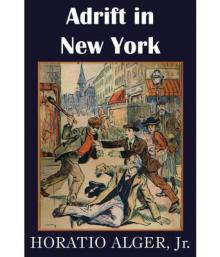 Adrift in New York: Tom and Florence Braving the World
Adrift in New York: Tom and Florence Braving the World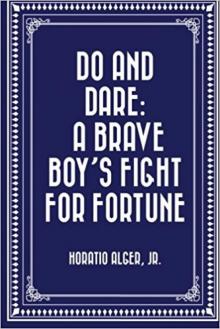 Do and Dare — a Brave Boy's Fight for Fortune
Do and Dare — a Brave Boy's Fight for Fortune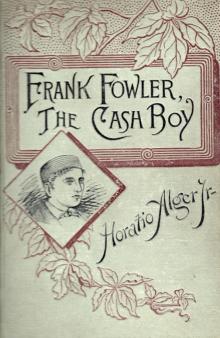 The Cash Boy
The Cash Boy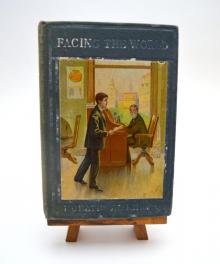 Facing the World
Facing the World The Young Explorer; Or, Claiming His Fortune
The Young Explorer; Or, Claiming His Fortune The Store Boy
The Store Boy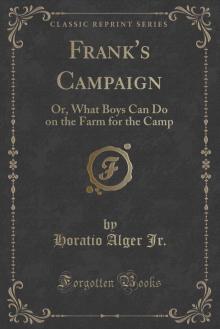 Frank's Campaign; Or, The Farm and the Camp
Frank's Campaign; Or, The Farm and the Camp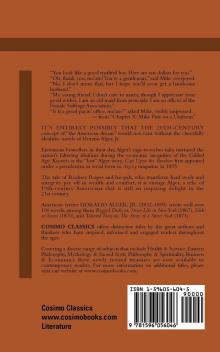 Cast Upon the Breakers
Cast Upon the Breakers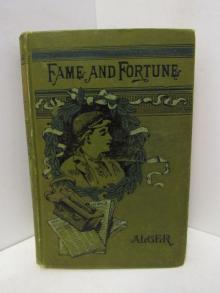 Fame and Fortune; or, The Progress of Richard Hunter
Fame and Fortune; or, The Progress of Richard Hunter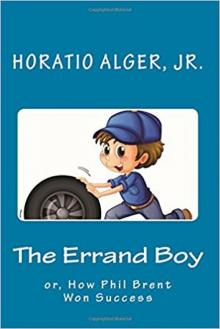 The Errand Boy; Or, How Phil Brent Won Success
The Errand Boy; Or, How Phil Brent Won Success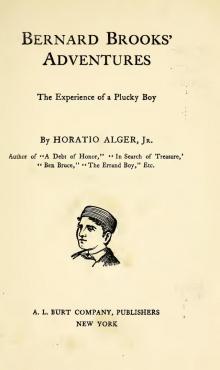 Bernard Brooks' Adventures: The Experience of a Plucky Boy
Bernard Brooks' Adventures: The Experience of a Plucky Boy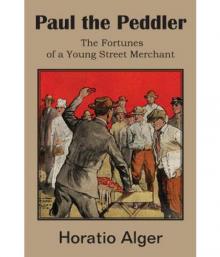 Paul the Peddler; Or, The Fortunes of a Young Street Merchant
Paul the Peddler; Or, The Fortunes of a Young Street Merchant Brave and Bold; Or, The Fortunes of Robert Rushton
Brave and Bold; Or, The Fortunes of Robert Rushton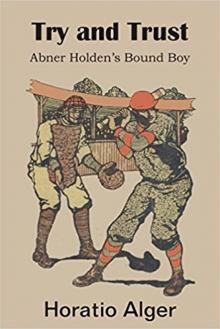 Try and Trust; Or, Abner Holden's Bound Boy
Try and Trust; Or, Abner Holden's Bound Boy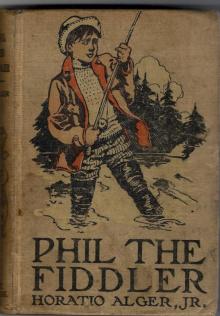 Phil, the Fiddler
Phil, the Fiddler In A New World; or, Among The Gold Fields Of Australia
In A New World; or, Among The Gold Fields Of Australia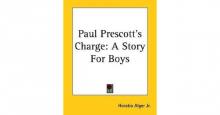 Paul Prescott's Charge
Paul Prescott's Charge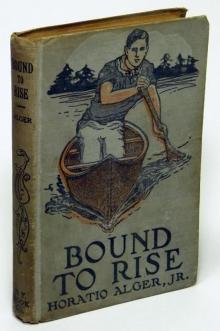 Joe's Luck; Or, Always Wide Awake
Joe's Luck; Or, Always Wide Awake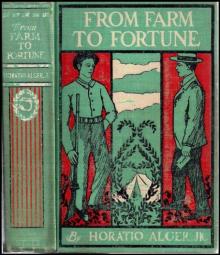 From Farm to Fortune; or, Nat Nason's Strange Experience
From Farm to Fortune; or, Nat Nason's Strange Experience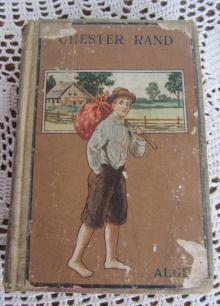 Chester Rand; or, The New Path to Fortune
Chester Rand; or, The New Path to Fortune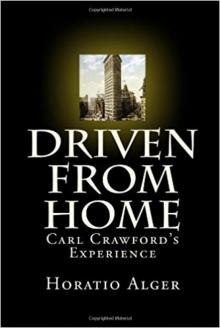 Driven from Home; Or, Carl Crawford's Experience
Driven from Home; Or, Carl Crawford's Experience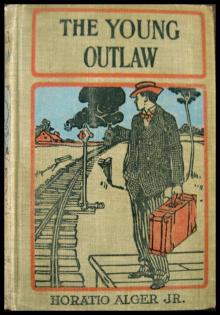 The Young Outlaw; or, Adrift in the Streets
The Young Outlaw; or, Adrift in the Streets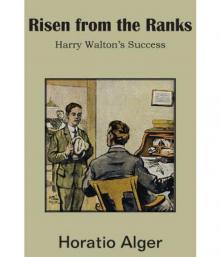 Risen from the Ranks; Or, Harry Walton's Success
Risen from the Ranks; Or, Harry Walton's Success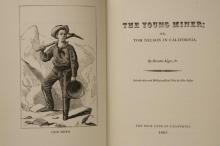 The Young Miner; Or, Tom Nelson in California
The Young Miner; Or, Tom Nelson in California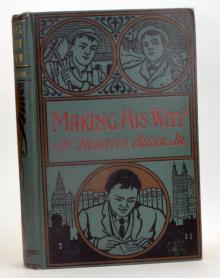 Making His Way; Or, Frank Courtney's Struggle Upward
Making His Way; Or, Frank Courtney's Struggle Upward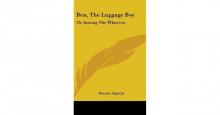 Ben, the Luggage Boy; Or, Among the Wharves
Ben, the Luggage Boy; Or, Among the Wharves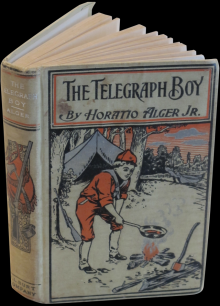 The Telegraph Boy
The Telegraph Boy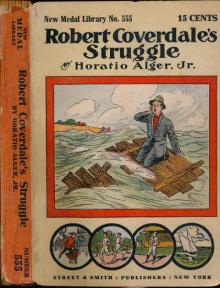 Robert Coverdale's Struggle; Or, on the Wave of Success
Robert Coverdale's Struggle; Or, on the Wave of Success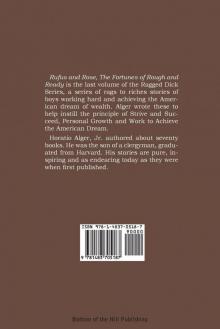 Rufus and Rose; Or, The Fortunes of Rough and Ready
Rufus and Rose; Or, The Fortunes of Rough and Ready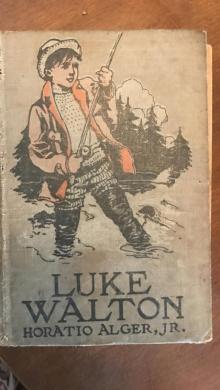 Luke Walton
Luke Walton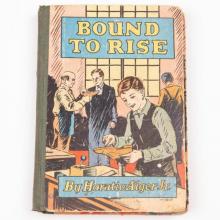 Mark Mason's Victory: The Trials and Triumphs of a Telegraph Boy
Mark Mason's Victory: The Trials and Triumphs of a Telegraph Boy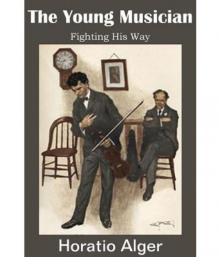 The Young Musician; Or, Fighting His Way
The Young Musician; Or, Fighting His Way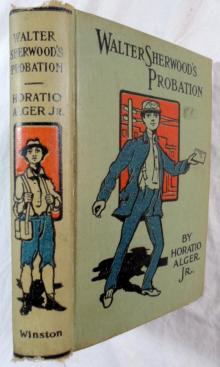 Walter Sherwood's Probation
Walter Sherwood's Probation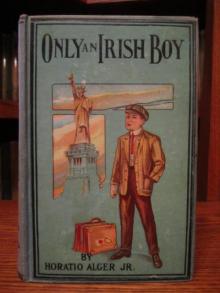 Only an Irish Boy; Or, Andy Burke's Fortunes
Only an Irish Boy; Or, Andy Burke's Fortunes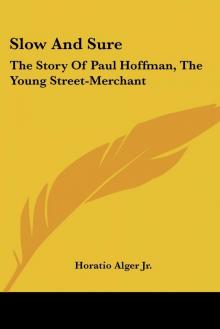 Slow and Sure: The Story of Paul Hoffman the Young Street-Merchant
Slow and Sure: The Story of Paul Hoffman the Young Street-Merchant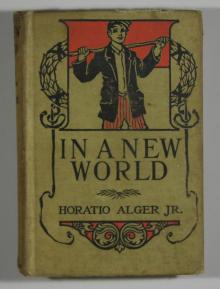 Herbert Carter's Legacy; Or, the Inventor's Son
Herbert Carter's Legacy; Or, the Inventor's Son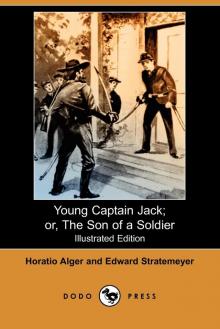 Young Captain Jack; Or, The Son of a Soldier
Young Captain Jack; Or, The Son of a Soldier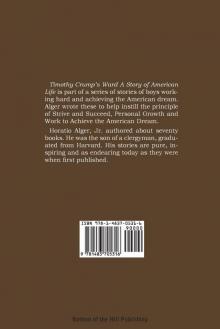 Timothy Crump's Ward: A Story of American Life
Timothy Crump's Ward: A Story of American Life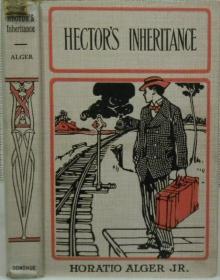 Hector's Inheritance, Or, the Boys of Smith Institute
Hector's Inheritance, Or, the Boys of Smith Institute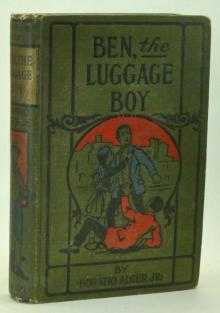 Ben's Nugget; Or, A Boy's Search For Fortune
Ben's Nugget; Or, A Boy's Search For Fortune